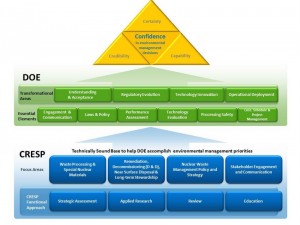About
The multi-university Consortium for Risk Evaluation with Stakeholder Participation (CRESP) has been funded as a Department of Energy (DOE) cooperative agreement for five years (2006 – 2011) awarded to Vanderbilt University as the lead organization. This five-year period is referred to “CRESP III,” as it was preceeded by two five-year cooperative agreements, CRESP I and CRESP II.
The objective of CRESP is to advance cost-effective, risk-based cleanup of the nation’s nuclear weapons production facility waste sites and cost-effective, risk-based management of potential future nuclear sites and wastes.
This objective is to be accomplished by seeking to improve the scientific and technical basis for environmental management decisions by the DOE and by fostering public participation in that search.
These CRESP III goals are pursued through four basic modes of activity, referred to as a functional approach:
- strategic assessment
- education
- research
- independent peer review
In each of these functions, CRESP is continuously engaging and fostering the effective participation of the full range of stakeholders, to help DOE integrate nuclear waste management.
Strong Record of Research, Assessment and Publication
CRESP I and II (1995-2006) built a strong record of major assistance through both research and assessment to DOE-EM cleanup processes while establishing an exemplary record of converting the lessons from those activities into publication primarily in the nation’s scientific and technical peer reviewed journals.
In its initial three and one-half years CRESP III has continued to define and carryout and publish relevant and applied research work. It is also continues to forge a series of innovations, particularly:
- metrics in developing a format for, and then exhibiting, a distinctive type of independent expert review that reduces technical uncertainty of complex projects and/or responds to project challenges with interdisciplinary teams and
- carrying out strategic analyses that illumine the causes and potential remedies for troubled nuclear waste management projects and programs and clarify paths for integrating the management of nuclear materials and wastes “at the back end” of fuel cycles and nuclear management regimes.
Each of the strategic assessment initiatives is typically supported by applied research projects developing new approaches in greater depth. Applied research projects regularly anticipate future DOE needs which have routinely also built on strengths of CRESP researchers.
